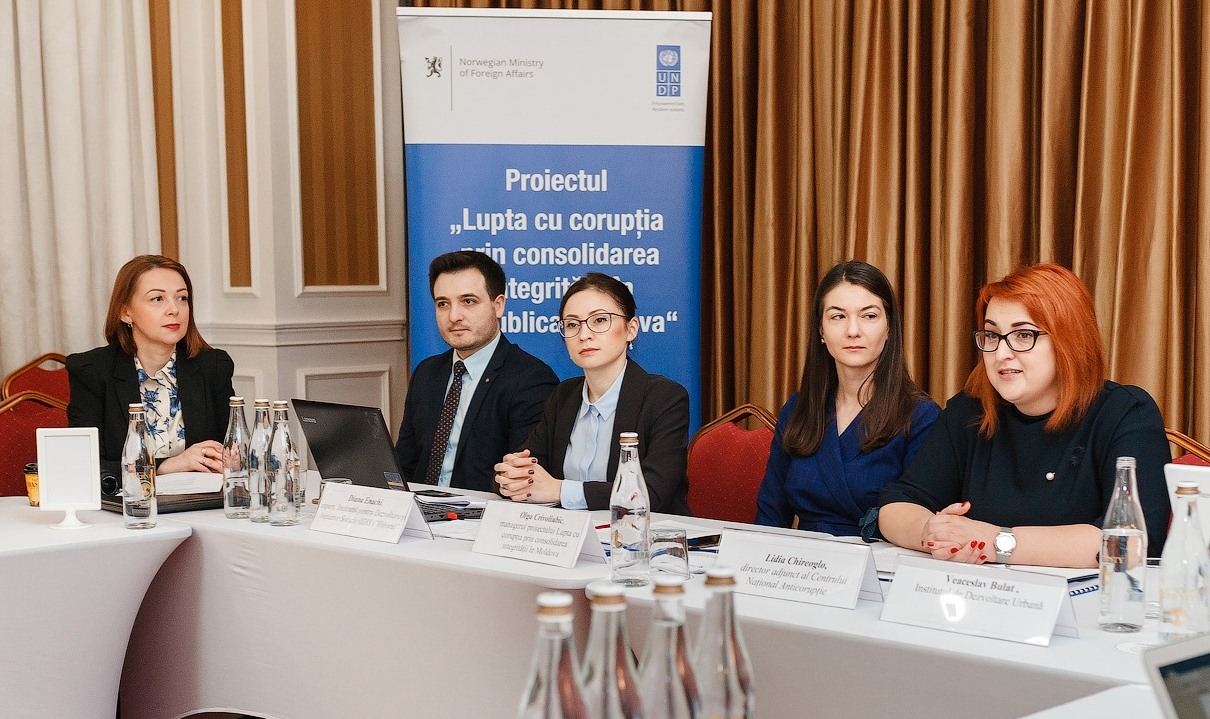
On February 21, the alternative monitoring report for 2019 on the implementation of the sectoral anti-corruption Action Plan in the field of public procurement was presented by IDIS "Viitorul" in Chișinău. The report was drafted and presented by IDIS "Viitorul" experts - Diana Enachi and Viorel Pîrvan within the Small Grants Program for alternative monitoring of sectoral and local anti-corruption plans in the framework of the "Fighting corruption by strengthening integrity in the Republic of Moldova" Project, implemented by UNDP Moldova with the financial support of the Ministry of Foreign Affairs of Norway.
The working session of the event was opened by the deputy-director of IDIS "Viitorul" - Carolina Ungureanu, who made an introduction to the topic explaining to the audience - composed of representatives of institutions with responsibilities in the implementation of anti-corruption action plans, of civil society, media and so on -, the fact that this was the second such monitoring report prepared by IDIS experts, and that the first one - concerning the implementation period of 2018, was publicly presented on September 3, 2019. Carolina Ungureanu underlined the continuity of these activities which indicates the long-term interest of IDIS "Viitorul" in the consistency of the anti-corruption efforts in the field of public procurement.
Olga Crivoliubic, the manager of the project "Fighting corruption by strengthening integrity in the Republic of Moldova" implemented by UNDP Moldova, underlined the importance that the UNDP attaches to alternative sources for monitoring the implementation of anti-corruption plans, and Lidia Chireoglo, deputy director of the National Anticorruption Center - the institution tasked with coordinating the implementation of the National Anti-corruption Strategy, mentioned that the NAC welcomes the involvement of the civil society and its watchdog role in monitoring the implementation of anti-corruption plans.
By monitoring the 10 actions provided in the plan, the report provides an X-ray of the progress registered in 2019. The monitoring methodology included both quantitative assessment and qualitative evaluation tools. The monitoring results attest that only 10% of the actions provided for in the plan for 2019 have been accomplished, 40% were partially accomplished, and half of the actions were have been deemed to be unaccomplished. Regarding the evaluation of the impact produced by the envisaged actions, a lack of impact was found in the case of 60% of the actions provided for in the Sectoral Plan.
The authors of the report came up with several recommendations aimed at eliminating the current shortages and increasing the efficiency of anti-corruption policies in the public procurement sector. Among them are the following: the finalization of and public consultation on the Regulation on the procurement of goods, works and services by the state-owned enterprises or by the joint-stock companies with majority state capital; elaborating an assessment of the benefits of centralization (on different areas/regions) with the analysis of the best international practices (piloting 1-2 sectors/regions); analyzing the opportunity to (re)introduce selective ex-ante control based on an approved methodology with risk indicators; amending the legal framework in order to grant the PPA (or another institution) the power to punish offenders who commit offenses in public procurement; ensuring the use of MTender by all contracting authorities and amending the legal framework in order to make low-value purchases compulsory through the MTender system; elimination of inconsistencies with the provisions of the legal framework;
The experts also recommended the development of the electronic procurement system in order to ensure the electronic performance of the complete cycle of a public procurement; ensuring transparency at all stages of the procurement process, especially at the stage of contract execution; the generation and electronic registration of contracts, the generation of reports according to the predetermined criteria); integration of a corruption risk assessment tool, etc.
The experts also made some recommendations regarding the framework for the implementation and monitoring of sectoral plans. These refer to: the need ofr a complete evaluation of the final progress regarding the implementation of the Sectoral Plan for the period 2018-2019, in order to identify the problems and the solutions for the subsequent implementation of the actions that have not been executed or have only been partially implemented; elaboration of a new Sectorial Plan for the next period (possibly 2020-2022) with the organization of public discussions and the involvement of all the actors involved in the procurement process; increasing the transparency in the activity of the entities responsible for the implementation of the Sectoral Plan, and publishing quarterly monitoring reports on the website of the MoF and the NAC; improving the current mechanism of dialogue between the responsible public institutions - for it to become an effective and permanent one, with clear roles and responsibilities for each institution.
This event was organized by IDIS "Viitorul" as part of the Small Grants Program for alternative monitoring of sectoral and local anti-corruption plans in the framework of the "Fighting corruption by strengthening integrity in the Republic of Moldova" Project, implemented by UNDP Moldova with the financial support of the Ministry of Foreign Affairs of Norway.